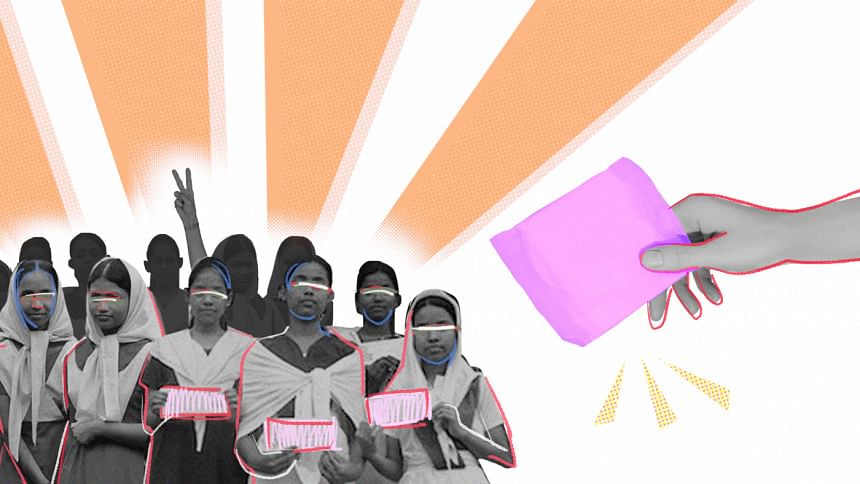Period poverty: A silent crisis in Bangladesh

Gossip travelled at light speed through the Class 4 girls' bathroom: a girl from a higher class had experienced her first period. As whispers rippled through the room, I stood there, grappling with an unexpected wave of confusion. Period, a word until now entirely absent from my dictionary, had taken centre stage.
My confusion persisted, but soon became shrouded by feelings of shame as my own menstruation started. Having to hide my sanitary pads from men in my family and boys in class, I worried whether a blood stain was showing on my clothes, stuttering anytime someone asked me why I could not pray or why I was feeling unwell. And these experiences are not uniquely mine, but shared by about 39 million menstruating women and girls aged between 15 and 49 in Bangladesh.
Such confusion, shame, embarrassment, and ostracism are by-products of a society that evades and suppresses conversations and education on menstrual health management (MHM). Only six percent of schools in Bangladesh provide MHM education, and according to the 2018 National Hygiene Survey, only 53 percent of adolescent girls had heard about menstruation before their first period. Lack of accessible and accurate information on MHM is a core aspect of menstrual or period poverty – which means poor access to affordable menstrual hygiene products, safe and private toilets or sanitation facilities, clean water, and waste disposal bins.
What we must recognise is that menstrual health management (MHM) and adequate access to basic sanitation are inextricably tied to women's socioeconomic well-being, and the realisation of their human rights, sexual and reproductive health rights (SRHR), dignity, and gender equality.
The silencing of dialogue on menstruation breeds myths, misinformation and stigma, perpetuating a vicious cycle of period poverty. As appropriate knowledge, resources and services remain scarce, families and peers fail to change their mindsets, and women and girls continue to avoid seeking help. All of these factors act as significant barriers to ensuring menstruating women and girls' education, health literacy, employment, opportunity to partake in sports, and safe water, sanitation, and hygiene (WASH), with 41 percent of Bangladeshi girls taking absence from school during their period and 86 percent being unable to change or dispose menstrual products due to a lack of safe and private WASH facilities.
What we must recognise is that MHM and adequate access to basic sanitation are inextricably tied to women's socioeconomic well-being, and the realisation of their human rights, sexual and reproductive health rights (SRHR), dignity, and gender equality. These two factors alone have been attributed to low educational attainment among girls, particularly in low-income and rural communities, as well as poor menstrual hygiene practices, leaving women and girls vulnerable to negative health outcomes such as skin irritation, urinary tract infections, pregnancy complications, and fistulae, to name a few.
Based on pilot studies done in Bangladeshi schools in 2014 and 2022, incorporating MHM education in school curricula has proven to be a powerful and effective pathway for transforming behaviours, values and norms related to menstruation and puberty among adolescents and women. Although WASH projects are regularly implemented, they rarely include MHM advocacy and education. Organisations such as UNFPA, UNDP, Brac, Foundation 21, WaterAid, and Wreetu, among others, have delivered MHM education programmes to limited numbers of beneficiaries, but having such programmes across all schools, with contextually tailored information for rural, disadvantaged or low-income communities, could ensure greater consistency, increased coverage, and widespread shifts in mindsets and behaviour.
Recommendations have emerged highlighting the need to combat period poverty through the widespread introduction of MHM programmes across all English and Bangla medium schools, as well as madrasas. These proposed actions are primarily focused on dismantling the barriers of misinformation and stigma surrounding menstruation. The suggestion is to launch these programmes as after-school activities, integrate them during or between classes, conduct seminars, or use any other format tailored to the community's needs. It is essential that these initiatives be age-specific, yet comprehensive, addressing topics such as basic sexual and reproductive health, dispelling social misconceptions, building self-esteem, promoting hygiene practices, ensuring safe disposal methods, and offering guidance on accessing affordable menstrual products and services.
These recommendations are in line with the National Menstrual Hygiene Management Strategy, introduced in 2021 by the government. This strategy envisions funding comprehensive behavioural-change training modules and making MHM education mandatory from Class 5 onwards. An integral part of the strategy emphasises involving mothers and guardians in MHM programmes. Research has underscored that mothers play a pivotal role in imparting menstrual knowledge to their daughters, sometimes imposing restrictions on movement, diet, and social activities based on misconceptions.
Engaging men and boys is also fundamental to creating an MHM-friendly environment, free from culturally reinforced patriarchal norms that undermine menstruating women's dignity and deprive them of the physical and emotional support they need. Moreover, for the successful rollout of gender-sensitive MHM education initiatives, capacity development of teachers, especially religious teachers, is paramount, and the urgency and importance given to MHM should not be compromised.
A lack of publicly available information raises questions on successful implementation of any strategy, making it critical to establish structured monitoring and evaluation frameworks, particularly for MHM programmes in remote and rural areas, low-income settlements, marginalised communities, and madrasas. In line with the national strategy, this limitation can be rectified through rigorous development of methodological and monitoring standards, and by having designated experts conduct technical programme evaluations to track progress, analyse results, identify barriers, and allow for improved design and strategic planning.
The combination of cultural stigma surrounding menstruation and puberty, low rates of literacy, and low decision-making power among women contribute to the continuing neglect of MHM education and awareness in households, schools, policymaking, and public institutions. I acknowledge that changing deeply entrenched unequal gender norms is not easy, as well as the challenges posed by disparities in socioeconomic status and geographical access to creating an MHM-friendly future. However, cultivating a social and political landscape that empowers and dignifies women, addresses MHM as a key public health issue, and stimulates tangible policy action, are steps in the right direction.
This article, along with its policy recommendations, draws from a policy brief co-authored by this writer. The brief was published by BacharLorai, a Canadian youth-driven social impact organisation run by Bangladeshi expats.
Madhuri Kibria specialises in sexual and reproductive health rights, and preventing and ending violence against women and girls.

 For all latest news, follow The Daily Star's Google News channel.
For all latest news, follow The Daily Star's Google News channel. 










Comments